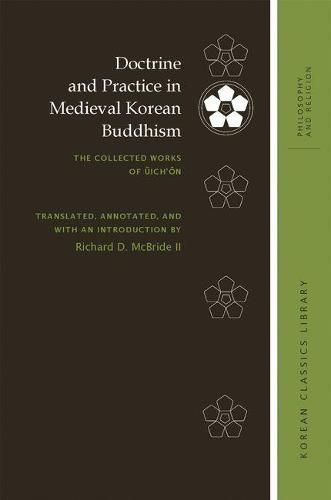Readings Newsletter
Become a Readings Member to make your shopping experience even easier.
Sign in or sign up for free!
You’re not far away from qualifying for FREE standard shipping within Australia
You’ve qualified for FREE standard shipping within Australia
The cart is loading…






?ich’?n (1055-1101) is recognized as a Buddhist master of great stature in the East Asian tradition. Born a prince in the medieval Korean state of Kory? (960-1279), he traveled to Song China (960-1279) to study Buddhism and later compiled and published the first collection of East Asian exegetical texts. According to the received scholarly tradition, after returning to Korea, ?ich’?n left the Hwa?m (Huayan) school to found a new Ch’?nt'ae (Tiantai) school when he realized that the synthesis between doctrinal learning and meditative practice in the latter would help bring together the discordant sects of Kory? Buddhism. In the late twentieth century, however, scholars began to question the assertion that ?ich’?n forsook one school for another, arguing that his writings assembled in The Collected Works of State Preceptor Taegak (Taegak kuksa munjip) do not portray a committed sectarian but a monk dedicated to developing a sophisticated and rigorous system of monastic education that encompassed all Buddhist intellectual traditions.
In this first comprehensive study of ?ich’?n’s life and work in English, Richard McBride presents translations of select lectures, letters, essays, and poetry from The Collected Works to provide a more balanced view of ?ich’?n’s philosophy of life and understanding of key Buddhist teachings. The translations center on the monk’s activities in the pan-East Asian Buddhist world and his compilation of scholarly texts, writings related to his interactions with royalty, and correspondence with his Chinese mentor, Jinshui Jingyuan (1011-1088). By incorporating ?ich’?n’s work associated with doctrinal Buddhism and his poetry, McBride clearly shows that even in his most personal work ?ich’?n did not abandon Hwa?m teachings for those of the Ch’?nt'ae but rather he encouraged monks to blend the best learning from all doctrinal traditions with meditative practice.
$9.00 standard shipping within Australia
FREE standard shipping within Australia for orders over $100.00
Express & International shipping calculated at checkout
?ich’?n (1055-1101) is recognized as a Buddhist master of great stature in the East Asian tradition. Born a prince in the medieval Korean state of Kory? (960-1279), he traveled to Song China (960-1279) to study Buddhism and later compiled and published the first collection of East Asian exegetical texts. According to the received scholarly tradition, after returning to Korea, ?ich’?n left the Hwa?m (Huayan) school to found a new Ch’?nt'ae (Tiantai) school when he realized that the synthesis between doctrinal learning and meditative practice in the latter would help bring together the discordant sects of Kory? Buddhism. In the late twentieth century, however, scholars began to question the assertion that ?ich’?n forsook one school for another, arguing that his writings assembled in The Collected Works of State Preceptor Taegak (Taegak kuksa munjip) do not portray a committed sectarian but a monk dedicated to developing a sophisticated and rigorous system of monastic education that encompassed all Buddhist intellectual traditions.
In this first comprehensive study of ?ich’?n’s life and work in English, Richard McBride presents translations of select lectures, letters, essays, and poetry from The Collected Works to provide a more balanced view of ?ich’?n’s philosophy of life and understanding of key Buddhist teachings. The translations center on the monk’s activities in the pan-East Asian Buddhist world and his compilation of scholarly texts, writings related to his interactions with royalty, and correspondence with his Chinese mentor, Jinshui Jingyuan (1011-1088). By incorporating ?ich’?n’s work associated with doctrinal Buddhism and his poetry, McBride clearly shows that even in his most personal work ?ich’?n did not abandon Hwa?m teachings for those of the Ch’?nt'ae but rather he encouraged monks to blend the best learning from all doctrinal traditions with meditative practice.